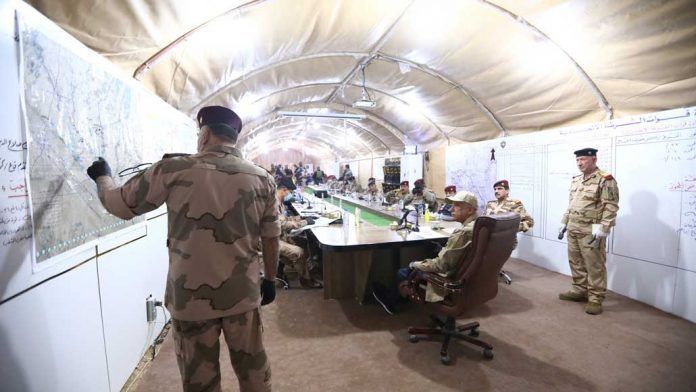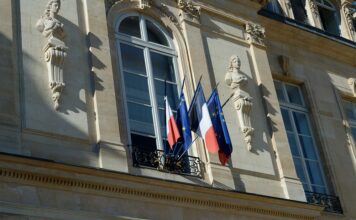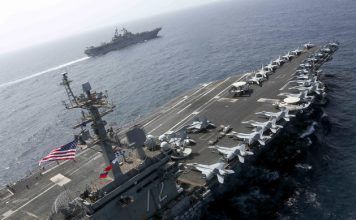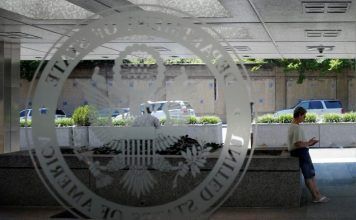
By Ahmad Rafat
In the early morning hours of June 26, the Iraqi Special Operations Forces (ISOF) raided the headquarters of Kata’ib Hezbollah (Hezbollah Brigades) in Dora, a neighborhood in the Al Rashid administrative district of southern Baghdad.
The ISOF seized several rockets and rocket launchers and captured 23 people, three of whom were commanders of the group and were subsequently handed over to the U.S. forces. Iraqi security forces took custody of the remaining 20 detainees.
A source close to the Iraqi government told Kayhan Life that one of the three men in U.S. custody is an Iranian national. The source does not know the identity of the captured Iranian, but said the man was a mid-level commander in the Islamic Revolutionary Guards Corps’ Qods Force (IRGC-QF).
There are some 5,200 U.S. troops stationed in Iraq at the present time. Washington has said it will not broaden its financial help to Iraq until the Islamic Republic’s influence in Iraq has been diminished significantly. Iraq is also facing an economic crisis: Its oil-based economy has suffered badly, with revenue dropping from $200 million to $25 million a day.
[aesop_image img=”https://kayhanlife.com/wp-content/uploads/2020/06/pompeo_alkazemi.jpg” panorama=”off” credit=”Prime Minister al-Kazemi and Secretary of States Mike Pompeo. Kayhan London” align=”center” lightbox=”on” captionsrc=”custom” captionposition=”left” revealfx=”off” overlay_revealfx=”off”]
The raid against ISOF is the most significant operation so far against a group within the Popular Mobilization Forces (PMF) umbrella.
The PMF — also known as the People’s Mobilization Committee (PMC) and the Popular Mobilization Units (PMU) — is an Iraqi state-sponsored umbrella organization comprised of some 40 militias that are mostly Shia Muslim groups, but also include Sunni Muslim, Christian, and Yazidi groups.
Kata’ib Hezbollah is an Iraqi Shia paramilitary group which is part of the PMF
Entifadh Kamal Qanbar, an Iraqi-American political analyst who lives in Washington D.C., told Kayhan Life: “Iraqi Prime Minister Mustafa al-Kazemi ordered the raid. Soon after the operation, Mr. Kazemi warned that the Iraqi government and security forces would deal decisively with those threatening U.S. interests.”
In the past six months, some 45 rocket and grenade attacks have been launched against the U.S. Embassy in Baghdad’s Green Zone (the International Zone of Baghdad), as well as against U.S. military bases in the center and north of the country and oil companies in southern Iraq.
“The assassination of [Lieutenant-General] Ghasem Soleimani [former IRGC-QF commander killed in a January U.S. drone attack on Baghdad International Airport] had another aim: to kill Abu Mahdi al-Muhandis, the commander of Kata’ib Hezbollah,” who also died in the drone attack, Mr. Qanbar noted. “Kata’ib Hezbollah was behind several attacks on the U.S. Embassy and military bases.”
“Most senior PMF commanders went into hiding after the deaths of Soleimani and al-Muhandis. They are even afraid of using their mobile phones,” Qanbar said. “After a series of attacks on its offices in the predominantly Shia areas in the south of Lebanon, Kata’ib Hezbollah has closed them all. The Islamic Republic has lost all support in the south.”
“Prime Minister al-Kazemi has been careful not to upset the Islamic Republic until now,” Qanbar noted. “He plans to free Iraq from the grip of [Iran’s Supreme Leader Ayatollah] Ali Khamenei. The move is not limited to curtailing the activities of Iraqi Shia militias controlled by the IRGC-QF: Mr. al-Kazemi also plans to reduce Iraq’s economic dependence on the Islamic Republic.”
[aesop_image img=”https://kayhanlife.com/wp-content/uploads/2020/06/2020-05-16T000000Z_1565148526_RC2QPG9TYJHY_RTRMADP_3_IRAQ-POLITICS-scaled.jpg” panorama=”off” credit=”Iraqi PM Prime Minister al-Kazemi wears a military uniform of Popular Mobilization forces during his meeting with Head of the Popular Mobilization forces Faleh al-Fayyad in Baghdad, Iraq May 16, 2020. REUTERS./” alt=”Iraqi Prime Minister al-Kazemi wears a military uniform of Popular Mobilization forces during his meeting with Head of the Popular Mobilization forces Faleh al-Fayyad in Baghdad, Iraq May 16, 2020. REUTERS./” align=”center” lightbox=”on” captionsrc=”custom” captionposition=”left” revealfx=”off” overlay_revealfx=”off”]
“The Iranian government is also worried that It might lose its gas and electricity market,” Qanbar said. “During a recent meeting with a visiting Iraqi delegation to Riyadh, Saudi officials offered to sell electricity to Baghdad at a much lower price” than Iran.
Iran sells $4 billion worth of electricity to Iraq every year. The governor of the Central Bank of the Islamic Republic of Iran, Abdolnaser Hemmati, recently met and held talks with his Iraqi counterpart Ali Mohsen Al-Alaq in Baghdad. Mr. Al-Alaq informed Mr. Hemmati that his country would not pay cash for electricity and gas that it buys from Iran any longer.
The U.S. has agreed that Iraq could pay Iran with food and medicine instead. The Iraqi system would be like the Swiss Humanitarian Trade Arrangement (SHTA), which was reached between the U.S. and the Swiss government in February. Under the scheme, Swiss companies may provide food, prescription medicine, and medical equipment to Iran without being penalized by stringent U.S. sanctions.
“The recent raid on the Kata’ib Hezbollah’s military base in Baghdad was the result of a remote video conference between Baghdad and Washington,” Qanbar added. “The discussions also included the role of the Islamic Republic in Iraq, the reduction of U.S. forces in that country, and economic aid.”
This article was translated and adapted from Persian by Fardine Hamidi.





